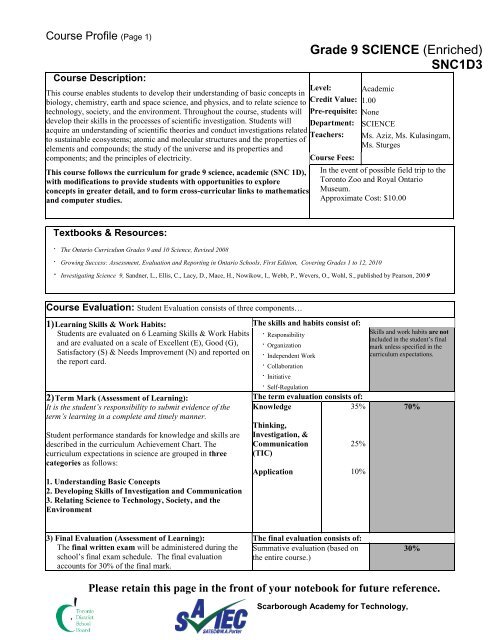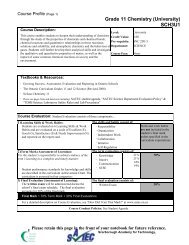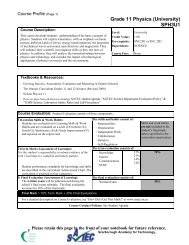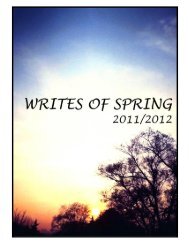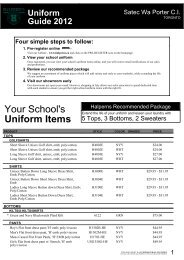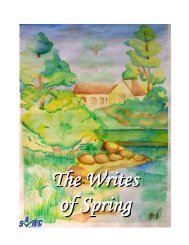Grade 9 SCIENCE (Enriched) SNC1D3
SNC1D3 - SATEC @ W.A. Porter C.I.
SNC1D3 - SATEC @ W.A. Porter C.I.
Create successful ePaper yourself
Turn your PDF publications into a flip-book with our unique Google optimized e-Paper software.
Course Profile (Page 1)<br />
Course Description:<br />
This course enables students to develop their understanding of basic concepts in<br />
biology, chemistry, earth and space science, and physics, and to relate science to<br />
technology, society, and the environment. Throughout the course, students will<br />
develop their skills in the processes of scientific investigation. Students will<br />
acquire an understanding of scientific theories and conduct investigations related<br />
to sustainable ecosystems; atomic and molecular structures and the properties of<br />
elements and compounds; the study of the universe and its properties and<br />
components; and the principles of electricity.<br />
This course follows the curriculum for grade 9 science, academic (SNC 1D),<br />
with modifications to provide students with opportunities to explore<br />
concepts in greater detail, and to form cross-curricular links to mathematics<br />
and computer studies.<br />
<strong>Grade</strong> 9 <strong>SCIENCE</strong> (<strong>Enriched</strong>)<br />
<strong>SNC1D3</strong><br />
Level:<br />
Credit Value:<br />
Pre-requisite:<br />
Department:<br />
Teachers:<br />
Course Fees:<br />
Academic<br />
1.00<br />
None<br />
<strong>SCIENCE</strong><br />
Ms. Aziz, Ms. Kulasingam,<br />
Ms. Sturges<br />
In the event of possible field trip to the<br />
Toronto Zoo and Royal Ontario<br />
Museum.<br />
Approximate Cost: $10.00<br />
Textbooks & Resources:<br />
· The Ontario Curriculum <strong>Grade</strong>s 9 and 10 Science, Revised 2008<br />
· Growing Success: Assessment, Evaluation and Reporting in Ontario Schools, First Edition, Covering <strong>Grade</strong>s 1 to 12, 2010<br />
· Investigating Science 9, Sandner, L., Ellis, C., Lacy, D., Mace, H., Nowikow, I., Webb, P., Wevers, O., Wohl, S., published by Pearson, 2009<br />
Course Evaluation: Student Evaluation consists of three components…<br />
1) Learning Skills & Work Habits:<br />
Students are evaluated on 6 Learning Skills & Work Habits<br />
and are evaluated on a scale of Excellent (E), Good (G),<br />
Satisfactory (S) & Needs Improvement (N) and reported on<br />
the report card.<br />
2) Term Mark (Assessment of Learning):<br />
It is the student’s responsibility to submit evidence of the<br />
term’s learning in a complete and timely manner.<br />
Student performance standards for knowledge and skills are<br />
described in the curriculum Achievement Chart. The<br />
curriculum expectations in science are grouped in three<br />
categories as follows:<br />
1. Understanding Basic Concepts<br />
2. Developing Skills of Investigation and Communication<br />
3. Relating Science to Technology, Society, and the<br />
Environment<br />
The skills and habits consist of:<br />
· Responsibility<br />
· Organization<br />
· Independent Work<br />
· Collaboration<br />
· Initiative<br />
· Self-Regulation<br />
The term evaluation consists of:<br />
Knowledge<br />
35%<br />
Thinking,<br />
Investigation, &<br />
Communication<br />
(TIC)<br />
Application<br />
25%<br />
10%<br />
Skills and work habits are not<br />
included in the student’s final<br />
mark unless specified in the<br />
curriculum expectations.<br />
70%<br />
3) Final Evaluation (Assessment of Learning):<br />
The final written exam will be administered during the<br />
school’s final exam schedule. The final evaluation<br />
accounts for 30% of the final mark.<br />
The final evaluation consists of:<br />
Summative evaluation (based on<br />
the entire course.)<br />
30%<br />
Please retain this page in the front of your notebook for future reference.<br />
Scarborough Academy for Technology,
Course Profile (Page 2)<br />
Final Mark = 70% Term Mark + 30% Final Evaluations<br />
<strong>Grade</strong> 9 <strong>SCIENCE</strong> (<strong>Enriched</strong>)<br />
<strong>SNC1D3</strong><br />
For a detailed description on Course Evaluation, see “How Did I Get That Mark!” at www.satec.on.ca<br />
Course Conduct Policies: See Student Agenda.<br />
Course Outline:<br />
Unit<br />
Biology:<br />
Sustainable<br />
Ecosystems<br />
Chemistry:<br />
Atoms Elements<br />
& Compounds<br />
Earth & Space<br />
Science: The<br />
Study of the<br />
universe<br />
Physics<br />
Scientific<br />
Investigation<br />
Skills and Career<br />
Exploration<br />
Note:<br />
Overall Expectations<br />
Approximate Major Unit<br />
Length Evaluation<br />
B1. assess the impact of human activities on the sustainability of terrestrial and/or 4 weeks Unit Test<br />
aquatic ecosystems, and evaluate the effectiveness of courses of action intended to<br />
remedy or mitigate negative impacts;<br />
B2. investigate factors related to human activity that affect terrestrial and aquatic<br />
ecosystems, and explain how they affect the sustainability of these ecosystems;<br />
B3. demonstrate an understanding of the dynamic nature of ecosystems, particularly<br />
in terms of ecological balance and the impact of human activity on the sustainability<br />
of terrestrial and aquatic ecosystems.<br />
C1. assess social, environmental, and economic impacts of the use of common 5 weeks Unit Test<br />
elements and compounds, with reference to their physical and chemical properties;<br />
C2. investigate, through inquiry, the physical and chemical properties of common<br />
elements and compounds;<br />
C3. demonstrate an understanding of the properties of common elements and<br />
compounds, and of the organization of elements in the periodic table.<br />
D1. assess some of the costs, hazards, and benefits of space exploration and the 3 weeks Unit Test<br />
contributions of Canadians to space research and technology;<br />
D2. investigate the characteristics and properties of a variety of celestial objects<br />
visible from Earth in the night sky;<br />
D3. demonstrate an understanding of the major scientific theories about the<br />
structure, formation, and evolution of the universe and its components and of the<br />
evidence that supports these theories.<br />
E1. assess some of the costs and benefits associated with the production of electrical 4 weeks Unit Test<br />
energy from renewable and non‐renewable sources, and analyse how electrical<br />
efficiencies and savings can be achieved, through both the design of technological<br />
devices and practices in the home;<br />
E2. investigate, through inquiry, various aspects of electricity, including the<br />
properties of static and current electricity, and the quantitative relationships between<br />
potential difference, current, and resistance in electrical circuits;<br />
E3. demonstrate an understanding of the principles of static and current electricity.<br />
A1. demonstrate scientific investigation skills (related to both inquiry and research)<br />
in the four areas of skills (initiating and planning, performing and recording,<br />
analysing and interpreting, and communicating);<br />
A2. identify and describe a variety of careers related to the fields of science under<br />
study, and identify scientists, including Canadians, who have made contributions to<br />
those fields.<br />
All of the above units will also include quizzes, labs, and assignments.<br />
Embedded within<br />
units.<br />
Note: The order of the units of study may change due to student needs and resources available during the course.<br />
Please retain this page in the front of your notebook for future reference.
Course Profile (Page 3)<br />
General Information:<br />
1 – As per SATEC school policy students are expected to come to class:<br />
a) in uniform and,<br />
b) with cell phones, mp3 players etc… unseen and not in use<br />
during class time.<br />
2- To be successful in science, students are expected to:<br />
a) come to class prepared with pen/pencil, paper, binder and<br />
resources for your particular science course,<br />
b) demonstrate academic honesty with their own work and when<br />
working with others,<br />
c) complete assignments in a timely manner and,<br />
d) follow necessary safety rules and procedures of a science lab.<br />
3- To seek extra help:<br />
a) speak to your Science Teacher and schedule a time to meet,<br />
b) use the school’s homework club to access peer tutors and/or,<br />
c) speak to your guidance counsellor to arrange for a tutor.<br />
<strong>Grade</strong> 9 <strong>SCIENCE</strong> (<strong>Enriched</strong>)<br />
<strong>SNC1D3</strong><br />
Science Department deadlines and plagiarism<br />
policy.<br />
<br />
<br />
<br />
<br />
Each assignment will have a due date. Handing in an<br />
assignment after the due date may result in a deduction of<br />
marks at the discretion of the teacher.<br />
Students must be in class on dates of any major evaluations.<br />
IF you miss a major evaluation (i.e. unit test, exam,<br />
presentation) you must give your teacher a note written and<br />
signed by your doctor or parent stating the health reasons<br />
that kept you from class. Without a doctor’s note, you will<br />
receive a mark of zero for that missed major evaluation<br />
If you know ahead of time that you will have an appointment,<br />
field trip, game, etc at the same time as the major evaluation,<br />
you must either arrange with your teacher to complete the<br />
evaluation before the scheduled date, or cancel your other<br />
plans so you can attend the evaluation.<br />
Plagiarism includes: copying another student’s work; buying<br />
essays; copying and pasting Web info and calling it your own<br />
work; using information from print or Internet media without<br />
identifying the source.<br />
<br />
To avoid plagiarism:<br />
Do not cheat; Do not copy. Keep your eyes on your own<br />
paper during tests and exams. Do not steal intellectual<br />
property. Reference information properly (MLA)<br />
We only need to suspect cheating to penalize you.<br />
There will be no warnings, only marks of zero.


